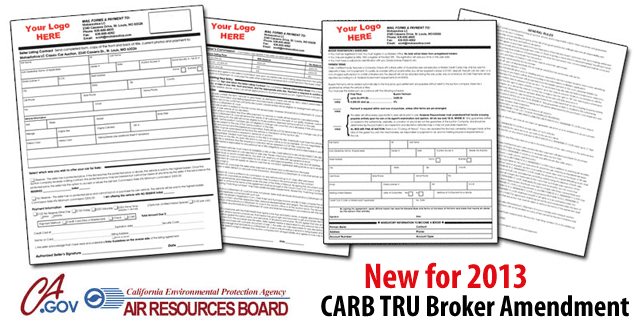Beginning January 1, 2013, the new requirements for brokers, forwarders, shippers, receivers, motor carriers, and drivers will take effect.
What is the requirement for brokers?

- Require the carriers they hire or contract with to only dispatch reefers that comply with ARB’s TRU ATCM in-use performance standards
- Provide contact information to the carrier so that dispatched drivers can present it to authorized enforcement personnel upon request. Contact information must include the broker’s company name, street address, state, and zip code and a contact person’s name and business phone number. *If a broker is not involved in arranging the transport of the load, then broker contact information is not required on bills of lading or related documents. CARB staff has indicated that as long as the broker provides their contact information to the driver, the requirement will be met.
The requirement applies to any broker that hires a carrier that will travel on a California highway or railway, regardless of where the broker or forwarder is based or conducting business. **CARB staff indicates that brokers are not responsible if a driver chooses to enter California by choice if the origin and destination are outside of California, but if the route the load in question is traveling on typically includes travel in California (i.e. AZ to OR), the broker should ensure compliance.
Brokers are not required to physically inspect TRUs to determine compliance or turn away non-compliant TRUs at docks. However, brokers must take steps to comply with the requirements.
What are the guidelines for demonstration of due diligence?
According, to the guidelines disseminated by CARB, the starting point for brokers and forwarders should be able to verify compliance by asking carriers to provide proof of compliance and reference the ARBER registration system for 100 percent-compliant carriers. Through the ARBER data system, brokers and forwarders can check carrier’s compliance status.
- Furthermore, the CARB “suggest” the following strategies that a broker or forwarder could use to ensure hiring a compliant carrier. These include:
- Businesses should consider sending an annual notice to their carrier base indicating that only carriers listed in the ARB’s 100 percent-compliant database will be considered for hire or contract when arranging freight that travels on California highways and railways
- Businesses (shippers) should include contract language in agreements between the shipper and broker or forwarder, or receiver and broker or forwarder that clearly requires only ARB-compliant TRUs to be dispatched on California highways and railways
- When advertising a load on an on-line load board, brokers should specify that the load requiring refrigerated transport equipment will travel on California highways or railways and the TRU used for the load must by ARB compliant
- A broker should document the steps during hiring and contract negotiations with the carrier showing that the carrier was notified that an ARB-compliant TRU is required and that the carrier confirmed the contractual obligation to only dispatch ARB-compliant TRUs on California highways and railways
- Broker include contract language that clearly states that only ARB-compliant reefers be dispatched on California highways and railways. For example, “Carrier or its agent certifies that any TRU equipment furnished will be in compliance with the in-use requirements of California’s TRU regulations.” This language should be highlighted and bolded and a space provided by for a signature of acknowledgment
- Require the carrier to provide to the broker the ARBER-certification page to show that the dispatched unit is compliant. This document may be used to show that there was a reasonable expectation that only certified-compliant reefer equipment would be used for a specific job, if the specific IDN is called out in the contract.
Are there certain exemptions?
There are certain exemptions, including any trailer TRU housing that remains attached to a trailer van, but the fuel tank and battery have been removed and a label with the word “NONOPERATIONAL” has been affixed or attached to the housing in letters that contrast sharply with the color of the TRU housing and can be seen 50 feet during daylight hours when the vehicle is stationary.
What are the penalties?
All persons found be to in violation of this regulation, may be citied and subject to the penalty provisions set forth in the California Health and Safety Code. The penalty is $1,000 for each occurrence.
If a carrier is found to have violated the requirement to dispatch only ARB-compliant TRUs on California highways or railways, the broker should take preventive steps to ensure no further hiring of that non-compliant carrier will happen.
>

